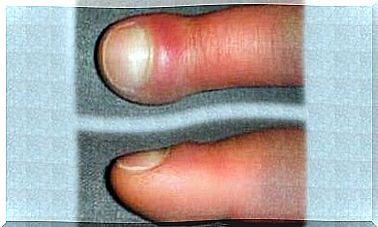Celiac Disease Or Gluten Intolerance: Causes And Symptoms
Gluten intolerance is a chronic disease characterized by poor absorption of nutrients due to the deterioration of the lining of the small intestine. If a correct diagnosis is made, many symptoms and complications can be avoided.

Celiac disease, or gluten intolerance, is chronic hypersensitivity to a protein found in certain foods such as grains. It is estimated to have a prevalence of 1% of the population and is more common in women than in men.
In France, it affects at least 600,000 people and the figures are increasing every year. One of the biggest issues is that around 75% of those affected have not been properly diagnosed.
This gluten intolerance occurs in people who have genes that predispose to this disease. It is characterized by an inflammatory reaction, of immune origin, in the lining of the small intestine. The absorption of macro and micronutrients is then affected.
As we have pointed out, it is a chronic disease of an autoimmune nature. This means that the immune system itself attacks the cells as a means of protection.
Celiac disease or gluten intolerance
What are the causes of gluten intolerance?

There is no single cause responsible for the development of gluten intolerance. It is a combination of factors that makes intolerance possible.
For example, a genetic predisposition, certain structural abnormalities of the small intestine as well as a diet with gluten are predisposing factors for the development of gluten intolerance.
For all these reasons, we can say that it is an intestinal disease that occurs in genetically sensitive people. These people actually have an intolerance to digest a protein found in gluten, gliadin.
When they eat gluten, their small intestines react and become inflamed. Therefore, it has difficulty in absorbing the necessary nutrients from food.
Diagnostic
The diagnosis of gluten intolerance is not straightforward. Indeed, until not so long ago, it was only diagnosed if there were clear clinical symptoms. This disease also exhibits a wide variety of symptoms which can be attributed to other diseases.
However, according to some experts, even in the absence of symptoms, it is possible to detect the disease at the slightest suspicion. Either by the presence of intolerant relatives, or for other reasons. For this, serological or genetic tests or histology are carried out.
On the other hand, nowadays, clinical diagnostic examinations such as blood tests including serological markers of celiac disease, are also carried out. These markers are antibodies like:
- Antigliadin
- Tissue anti-transglutaminases
- Anti-endomysium
Symptoms of gluten intolerance

If a person with gluten intolerance ingests a food that contains gluten, their body will create an autoimmune reaction that will cause inflammation and damage to the lining of the small intestine, so these are the most common symptoms:
- Nausea
- Vomiting
- Diarrhea
- Low weight
- Growth problems
In adults, most cases have more subtle symptoms such as mild diarrhea, weight loss, anemia, or in 10% of cases a tendency to constipation.
Since the small intestine is not able to absorb the necessary nutrients, there is therefore poor intestinal absorption. Other symptoms such as bruising or nosebleeds can result.
In addition, it is normal for the patient to be tired or have itchy skin. Even he develops dermatitis herpetiformis and loses his hair.
In addition, ulcers often appear in the mouth and women usually have no period. It is also common to suffer from muscle cramps or have an intolerance to other nutrients, such as lactose, for example.
Can celiac disease have no symptoms?
It should be noted that not all gluten intolerant patients have the symptoms mentioned above. Indeed, some people do not even present any.
In this case, one can then wonder how it is possible to diagnose this disease in the absence of symptoms.
The explanation is that gluten intolerance is a disease for which there is a genetic predisposition. And for its diagnosis, as we have seen, a blood test is carried out with markers of the disease. However, intestinal deterioration can also be observed after a biopsy.
In short, although a patient may not have the most obvious symptoms such as vomiting or diarrhea, the intestinal lining can still be affected. Consequently, damage to the mucosa can progress to other diseases or similar complications if a suitable diet is not followed.









